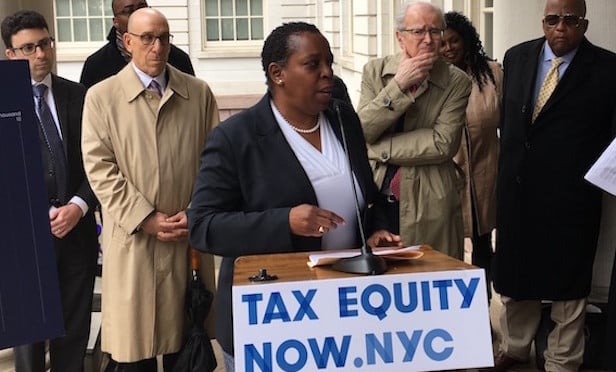
NEW YORK CITY—The city's real estate property taxes are hooking up strange bedfellows. On Monday, Democratic and Republican City Council members announced they filed an amicus brief supporting Tax Equity Now New York's lawsuit demanding tax reform. TENNY is a coalition of New York City homeowners, renters, rental property owners and civil rights groups, advocating reform to a system which they say overly burdens low-income people and minorities.
Martha Stark, director of policy for TENNY, says this support from Council members Fernando Cabrera (D-14th District, the Bronx), Donovan Richards (D-31st District, Queens), Ritchie Torres (D-15th District, the Bronx), Eric Ulrich (R-32nd District, Queens) and Jumaane D. Williams (D-45th District, Brooklyn) marks a significant milestone for their cause. She tells GlobeSt.com that TENNY has brought together a diverse coalition of voices to help people understand the property tax system and will work to force action.
Judge Jonathan Lippman, of counsel at Latham & Watkins and the attorney for TENNY, agrees that the council members' joining the lawsuit strengthens their case that alleges the tax system violates the New York State Constitution, New York's real property tax law and federal law.
Recommended For You
Want to continue reading?
Become a Free ALM Digital Reader.
Once you are an ALM Digital Member, you’ll receive:
- Breaking commercial real estate news and analysis, on-site and via our newsletters and custom alerts
- Educational webcasts, white papers, and ebooks from industry thought leaders
- Critical coverage of the property casualty insurance and financial advisory markets on our other ALM sites, PropertyCasualty360 and ThinkAdvisor
Already have an account? Sign In Now
*May exclude premium content© 2025 ALM Global, LLC, All Rights Reserved. Request academic re-use from www.copyright.com. All other uses, submit a request to [email protected]. For more information visit Asset & Logo Licensing.








